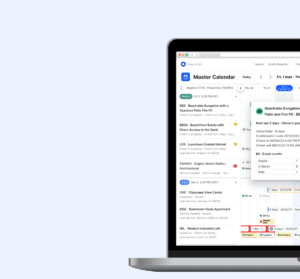How Little City Streamlined Operations and Set the Stage for Massive Growth

Background
In the competitive world of property management, efficiency and adaptability are key to staying ahead. For Little City, a pioneering property management company in Australia, the journey from inception to becoming a market leader was filled with opportunities and challenges.
We sat down with Michelle La Roche, Founder and Managing Director of Little City, to delve into their story of transformation and growth.
Back in 2016, Michelle and her team recognized a gap in the Australian property market. The demand for long-term rentals was steady, but an emerging trend was beginning to take shape: the rise of short-stay accommodations. Platforms like Airbnb were gaining popularity, and travelers were seeking more personalized and flexible lodging options.
Embracing this dual focus allowed Little City to tap into a broader market. However, it also introduced a new level of complexity into their operations.
"We initially had intentions to start a long-term rental agency," Michelle recalls. "But around 2016-2017, short-stay accommodation management was emerging as a significant opportunity in Australia. We saw the potential to offer a unique combination of both long-term and short-term management services."
- Michelle La Roche, Founder and Managing Director of Little City
Challenges

As Little City expanded its portfolio, managing the intricacies of both long-term and short-term rentals became increasingly challenging. The team found themselves grappling with:
- Inefficient Maintenance Management: Regular and ongoing maintenance tasks were becoming a logistical nightmare. Without a unified system, scheduling and tracking maintenance led to oversights and frustrated tenants.
- Disorganized Task Assignments: One-off tasks, especially those for the housekeeping team, were coordinated through a Slack channel. This ad-hoc method resulted in messy communications and, at times, missed assignments.
- Fragmented Systems: The reliance on multiple platforms was hindering efficiency. They used Guesty as their PMS, PropertyMe for maintenance (despite it being designed for long-term rentals), and Teamwork as a knowledge base. This patchwork of tools lacked cohesion and made oversight difficult.
"Our operations felt disjointed, we were spending more time managing our systems than our properties. It was clear we needed a change."
- Michelle La Roche, Founder and Managing Director of Little City
Operto Solutions
The turning point came from an unexpected source. Little City’s virtual assistant had experience with a platform called Operto from a previous client.
“When I asked if she had any suggestions, she mentioned Operto,” Michelle says. Intrigued by the possibility of a one-stop solution, the team decided to explore what Operto had to offer.
From the outset, Operto presented itself as a comprehensive platform designed to address the very pain points Little City was experiencing. The decision to implement Operto was met with both excitement and a hint of skepticism.

"At first, Operto seemed over-complicated. The sheer number of features was overwhelming, and I was hesitant about diving into a new system."
- Michelle La Roche, Founder and Managing Director of Little City
However, with the guidance of Corrine, an experienced onboarding specialist from Operto, the transition began smoothly.
"Corrine was outstanding, her support made all the difference. She walked us through every step, ensuring we understood how to leverage Operto's capabilities fully."
- Michelle La Roche, Founder and Managing Director of Little City
Key features that made a difference
- Automated Task Scheduling: The ability to schedule recurring tasks, such as smoke alarm checks, automated routine maintenance and ensured compliance.
- Unified Communication Platform: Operto consolidated various operational processes, reducing reliance on scattered tools like Slack and PropertyMe.
- Enhanced Visibility and Control: Features like waste management scheduling allowed the communications team to monitor when bins needed to be taken out, improving property upkeep.
Results

The impact of implementing Operto was felt almost immediately. Little City began to experience significant improvements across the board.
- Saved over 12 hours per week in administrative and coordination tasks due to automated scheduling and unified communications.
- Reduced task miscommunications by 90%, leading to smoother operations and fewer missed assignments.
- Improved maintenance response time by 75%, ensuring property issues are addressed promptly and enhancing guest satisfaction.
- Increased team productivity by 28%, allowing staff to focus on strategic initiatives rather than manual processes.
- Boost their Operational Control: Gaining control over previously challenging areas, such as maintenance and waste management, improved property standards and guest satisfaction.
- Foundation for Growth: With streamlined operations, Little City is now better positioned to focus on expanding their interstate portfolio.
“It has contributed to efficiency by streamlining processes. It has also allowed us to gain control over certain parts of the business that were previously suffering, for example waste management at properties where our communications team can now see when bins are to be taken out.”
- Michelle La Roche, Founder and Managing Director of Little City
Streamlining Processes
Before Operto, managing tasks and maintenance was disjointed and inefficient. Operto’s platform allowed Little City to automate scheduling and provide detailed task information through digital checklists. This led to efficient task coordination by assigning the right tasks to the right team members based on availability and location. Plus, proactive issue resolution because teams could communicate issues promptly, leading to faster resolutions.
Setting a Standard of Excellence
Operto enabled Little City to set clear expectations and maintain high standards:
- Detailed Checklists and Reference Materials: Staff had access to all necessary information to perform tasks to Little City’s standards.
- Quality Assurance: Enhanced oversight ensured that properties were maintained consistently, leading to better guest experiences.
Overcoming Initial Challenges
While Operto’s extensive features initially seemed over-complicated, the investment in training and onboarding proved invaluable:
- Dedicated Support: Corrine’s outstanding onboarding support helped the team understand and utilize Operto’s capabilities fully.
- Continuous Learning: Emphasizing the importance of learning the system unlocked its full potential for operational efficiency.
Scaling the Business
With operational efficiencies in place, Little City could shift focus toward growth:
- Time for Strategic Initiatives: Leadership could dedicate more time to expanding their property portfolio and exploring new markets.
- Preparedness for Expansion: Streamlined operations provided a solid foundation to support interstate growth ambitions.
Operto has been instrumental in transforming Little City’s operational efficiency. By consolidating multiple processes into one platform, they overcame significant challenges and are now well-positioned for future growth. The partnership exemplifies how adopting the right technology solutions can revolutionize operations in the accommodations industry.
What’s next for Little City?
Little City plans to leverage Operto’s capabilities to support their expansion goals. By focusing on interstate growth, they aim to capitalize on new markets while maintaining high operational standards.
Ready to transform your operations?
Chat face-to-face with an Operto representative and see why thousands of hospitality businesses trust our solutions to deliver exceptional guest experiences.


